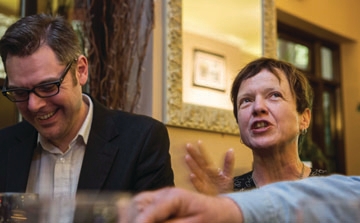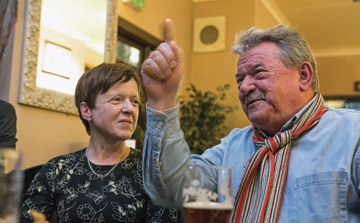You are viewing 1 of your 1 free articles
Running commentary from Inside Housing's editors
They have more than 60 years’ experience in housing journalism between them - but what do they really think about the sector? Nick Duxbury gathered Inside Housing editors past and present to find out
It’s one of the first rules of journalism: avoid becoming the story. If anyone should know better it is the four seasoned hacks hunkered down around the table of a south London pub. Each of them has been at the helm of Inside Housing at some point over the past 30 years. They are four of nine editors (see Editor timeline) who have been responsible for shining a light on the good, the bad and the ugly in the housing sector each week since March 1984 through a potent combination of breaking stories, investigations, features and campaigns. During their respective tenures, apart from when writing their carefully crafted weekly leader columns, all were at pains to remain objective and impartial in their coverage of the sector. Not tonight, though. Tonight, liberated from the tethers of editorship (apart from current acting editor Martin Hilditch), they have all finally become the subject of a story in the magazine they once ran.
To celebrate Inside Housing’s 30th anniversary, they have gamely agreed to reunite and share their memories of the scoops, the scandals, what has changed over the past three decades and what hasn’t - and, of course, their views on the future.
Each editor represents a different generation of housing professional. If, for example, you read the magazine during the reign of Bill Randall, now chair of housing at Brighton & Hove Council, but once the first editor - indeed the founder - of Inside Housing, not to mention a long-standing columnist, then this means you have worked in housing for an impressive 30 years. Congratulations. Seated next to him is Kate Murray, who edited the magazine for eight years until January 2009 - a period associated with the Blair-era Labour government’s decent homes programme.
She sits opposite Stuart Macdonald, who departed last month after five years reporting on some of the biggest changes in the history of the sector as the coalition government ceased funding social rented homes and introduced welfare cuts. Flanking him is Martin, an award-winning housing journalist of 10 years and the most recent heir to the Inside Housing throne. He represents the next chapter for an increasingly tech-savvy, commercially-minded generation of housing professional - whatever this chapter might look like.
Of course, being journalists, it took the promise of free alcohol and bar snacks to get them here. And there is at least half an hour of reminiscing about a golden age of journalism - one in which a boozy ‘long lunch’ was an everyday occurrence; PR teams had barely been formed, let alone begun sending in grainy photos of people in hard hats cutting ribbons with giant scissors, holding giant cheques, or even passing giant keys to a proud new homeowner; an era in which fax machines were considered revolutionary technology; and when The Daily Express would pay a freelance rate of £600 for a 900-word column on social housing. But after the first round of drinks conversation quickly moves to views on the housing sector.
History repeating
It is clear everyone in the room has considerable passion for both housing and the people who work in it. But mutual frustrations emerge. The most obvious one is that the same issues Bill was writing about in 1984 under Margaret Thatcher are recurring now. Cuts to housing budgets, an overarching emphasis on homeownership and a policy that doesn’t boost supply, but erodes the affordable housing stock (the right to buy) are all relevant concerns today. ‘It feels pretty circular,’ he observes.
‘Looking back to the first edition of Inside Housing I edited, there was something about setting up arm’s-length management organisations, and then also the desperate shortage of affordable housing and empty homes,’ agrees Kate.
‘I often feel if a brick had been laid for every word I have written about housing then there wouldn’t be a housing crisis,’ jokes Bill.
Is that a bit depressing?
‘There was a social housing programme [in 1984],’ notes Bill. ‘There was something. Now there’s not - and that’s the big difference.’
‘The worry is how do you move beyond that,’ says Kate. ‘We don’t want the sector just talking to itself about these things. The number of times people say they are going to get housing to the top of the agenda ahead of the big elections.’
Stuart wades in: ‘The big frustration I had during my five years in the job was getting people to stick their heads above the parapet. People don’t always stand up and be counted.’
‘But do they want to do that?’ asks Bill. ‘Some of them are chasing profit so hard I am not sure they want to.’
Kate has some sympathy with this sentiment. ‘What is that relationship with government?’ she asks. ‘Is it a client relationship of reliance or a true partnership?’
This debate calls for a straw poll: have housing associations have lost their way? Yes or no? The result is one ‘yes’ from Bill, and the rest say ‘no’. Of course these answers come with many caveats - Bill, for instance, stresses he thinks ‘housing associations have done great work’.
Commercial world
Given much of the change has been driven by the need to become more commercial as a result of grant cuts, another straw poll ensues. Will a government ever fund the development of social rent (not affordable rent) homes again? A big pause. This time, there is one ‘no’ (Stuart), and three who say ‘yes’. Stuart describes himself as a ‘realist’ rather than a pessimist on this point. ‘Why would they [the government] reintroduce it [grant for social rent]? Housing associations are far bigger and more powerful than they were,’ he reasons, arguing that commerciality can be a positive force that can be used to meet housing need in lieu of support from the government.
Time for another round of drinks and a change of subject: how does the sector respond to stories in our pages that made uncomfortable reading?
Inevitably, the example cited is Inside Housing’s best read, and most loathed (by housing bosses, at least) feature: the annual chief executives’ salary survey.
‘When I first got the job, everyone said: “Good to have you have on board - but you have got to sort out that salary survey”,’ recalls Stuart. ‘I remember thinking to myself: “I definitely have to keep that going”.’
Martin argues that organisations that have been reluctant to provide their chief executive’s salary are often the ones that have ended up in regulatory dire straits - while Kate is philosophical.
‘There is no way you just want to be a cheerleader,’ she says. ‘Housing is a great sector to report on and write about because there’s so much happening. But there can be a sense that “we know we are doing a good thing, and if you publicise something that doesn’t make us appear in such a good light, you are…’
‘Either with us or against us?’ suggests Martin. Kate nods.
‘It’s a cliché, but Inside Housing is supposed to be a critical friend. If it’s not then it’s not doing its job properly,’ states Stuart.
Martin flags some hard examples of why having a critical friend is important: it can save lives. Inside Housing’s Safe as Houses campaign, which ran in the wake of the Lakanal House tower block blaze that tragically killed six people in 2009, exposed many landlords’ failings, but, in doing so, improved safety standards.
‘We have changed health and safety in social housing,’ says Martin. ‘I don’t think we have alienated the readership in doing so. We have just had a grown up conversation and pushed people a bit.’
Fond memories
Gripes aside, everyone remembers their time in the sector fondly. It speaks volumes that the majority of Inside Housing’s editors (not just those present tonight) have remained involved in or connected to housing or social policy. Bill worked at the National Housing Federation before setting up Inside Housing. He has since sat on housing association boards, and remained a passionate advocate for affordable housing as a politician in Brighton. Kate’s mother ran a housing association, so she developed an interest in the sector.
Martin had his introduction to housing when he first moved to London and lived with his uncle Steve, better known in the sector as a former head of policy for Shelter who was advising the Labour Party on housing policy at the time. As a result, Martin would often see copies of Inside Housing lying around the house.
So why housing? ‘I know it sounds sanctimonious, but I felt like, at the time, I was doing something worthwhile,’ says Bill.
‘I think that’s true,’ agrees Stuart. ‘I wouldn’t say [that feeling] necessarily influences your editing. But as a subject matter it is compelling.’
‘Essentially the reason journalists work at Inside Housing rather than anywhere is that they subscribe to some of those values,’ argues Kate. Indeed, she feels the relationship between the magazine and sector is what makes Inside Housing special.
‘I felt the sense of reader loyalty while I was editing the magazine,’ she adds. ‘People always wanted to contribute - although the way this is happening has changed a bit - there’s still that sense of Inside Housing…’
Bill finishes her sentence: ‘…being theirs.’
There is silence as everyone gulps their drinks in agreement.
Editor timeline
Between March 1984 when Inside Housing was first launched and April 2014 there have been 20 housing ministers, and nine editors:
1984
Editor: Bill Randall
Housing ministers: Ian Gow and John Patten
1986
Editor: Donald Hirsch
Housing minister: John Patten
1987
Editor: Rosalind Bayley
Housing ministers: William Waldegrave, Earl of Caithness, Michael Howard, Michael Spicer and Sir George Young
1993
Editor: Julian Dobson
Housing ministers: Sir George Young and Viscount Ullswater
1999
Editor: Huw Morris
Housing minister: Nick Raynsford
2000
Editor: Kate Murray
Housing ministers: Nick Raynsford, Lord Charles Falconer, Lord Jeff Rooker, Keith Hill, Yvette Cooper and Caroline Flint
2005-06
Editor: Karen Day (maternity)
Housing minister: Keith Hill
2009
Editor: Stuart Macdonald
Housing ministers: Margaret Beckett, John Healey, Grant Shapps, Mark Prisk and Kris Hopkins
2014
Editor: Martin Hilditch
Housing minister: Kris Hopkins (present)



